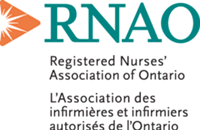Pandemic puts health system to the test: Nurses have answers for shortfalls
TORONTO, May 12, 2020 /CNW/ - COVID-19 in Ontario is a tale of two pandemics. One is the management of the spread in the general population and its containment though physical distancing, self-isolation and hospitalization, when necessary. The second tale of COVID-19 is the devastating spread in congregate settings – all related to vulnerable populations.
This second tale signals a crying need to enhance community care as we take stock of lessons-learned. Precious lives were lost due to weaknesses in our health system, in particular the neglect of congregate settings such as nursing homes, retirement homes and shelters.
"The impact on our long-term care sector is tragic, but the tragedy could have been diminished with faster action and earlier integration of this sector into health-system transformation. Currently, long-term care is not considered a mandatory component of Ontario Health Teams (OHTs)," says Dr. Doris Grinspun, RNAO CEO. "To honour the lives lost of our mothers, fathers, grandmothers, grandfathers and other vulnerable and elderly Ontarians, we must integrate long-term care into our OHT structure and never again leave them on the sidelines," Grinspun adds.
What the second tale also implies is that community care has been virtually shut down. There is currently little to no health promotion, illness prevention, primary care, home care or community service available. In contrast, hospitals were well-prepared with equipment and staff, as they should be. This lack of sector balance with a community care infrastructure seen as dispensable points once again to a hospital-centric health system.
"As we see the light at the end of the COVID-19 tunnel, we should strive for a truly integrated health system that values and adequately funds all sectors. Building robust community care and anchoring our health system in primary care – these must be priorities ahead of a potential second or third wave of COVID-19," says Dr. Angela Cooper Brathwaite, RNAO president. "Our vision of enhanced community care is aligned with the 2019 Ontario government plans to reshape our health transformation agenda, and addresses key areas for additional reform," Cooper Brathwaite emphasizes.
Today, RNAO is releasing ECCO 3.0 – Enhancing Community Care for Ontario. It provides the path forward through a comprehensive assessment of the current health system and its fractured response to COVID-19.
The report's nine recommendations are:
- expand reach and access to primary care and link all Ontarians to a primary care team
- establish approaches to care that are person-centred and focus on health promotion and disease prevention, equity and community engagement
- ensure all primary care is provided through an inter-professional team-based model
- make comprehensive care co-ordination, based in primary care, available to all
- enhance all community care services across the continuum of care
- re-imagine long-term care as 'home' to its residents by integrating nursing and retirement homes into enhanced community care plans and funding
- demonstrate a commitment to evidence-based practice across the health system
- optimize digital health technologies to improve access and support person-centred care
- maximize and enable the full scope of practice of all regulated health professionals
ECCO 3.0 also contains four transition recommendations necessary to move from the current state to the transformed health system. They mandate that government:
- include primary care in a leadership role in the process of transforming the system
- use a funding model for Ontario Health Teams (OHT) that improves patient experience, patient outcomes, lowers the cost of care, and improves provider experience
- develop a single health-system planner and funder that oversees and supports networks of local health teams, allowing for enhanced health services and processes
- align independent public health entities with the integrated health system, while increasing the overall funding to public health
The Registered Nurses' Association of Ontario (RNAO) is the professional association representing registered nurses, nurse practitioners, and nursing students in Ontario. Since 1925, RNAO has advocated for healthy public policy, promoted excellence in nursing practice, increased nurses' contribution to shaping the health system, and influenced decisions that affect nurses and the public they serve. For more information about RNAO, visit our website at RNAO.ca or follow us on Facebook and Twitter.
SOURCE Registered Nurses' Association of Ontario

For more information, or to arrange an interview with a nurse, please contact: Kimberley Kearsey, Communications Project Manager, Registered Nurses' Association of Ontario (RNAO), Phone: 416-802-9827, [email protected]; Alicia Saunders, Communications Assistant, Registered Nurses' Association of Ontario (RNAO), Phone: 905-715-1993, [email protected]

Share this article